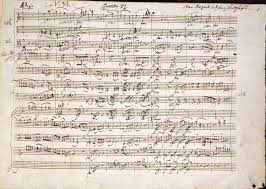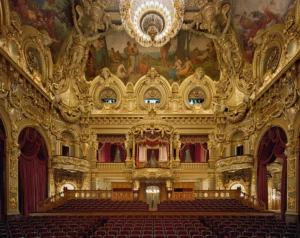Wolfgang Amadeus Mozart, born in 1756, was a prolific and influential composer of the classical era. He composed more than 800 works, many of which are acknowledged as pinnacles of symphonic, concertante, chamber, operatic, and choral music. Mozart is among the greatest and most enduringly popular of classical composers, and his influence is profound on subsequent Western art music.
Mozart’s music, like Haydn’s, stands as an archetype of the classical style. His works spanned the period during which that style transformed from one exemplified by the style galant to one that began to incorporate some of the contrapuntal complexities of the late Baroque, complexities against which the galant style had been a reaction. Mozart’s own stylistic development closely paralleled the development of the classical style as a whole.
Mozart’s Compositions
Mozart’s compositions, much like his life, were a whirlwind of innovation and exploration. He composed in several genres, including symphony, opera, solo concerto, chamber music including string quartet and string quintet, and the piano sonata. These forms were not new, but Mozart advanced their technical sophistication and emotional reach.
Some of his most notable works include the operas The Marriage of Figaro, Don Giovanni, and The Magic Flute, the symphonies No. 40 in G minor, K. 550, and No. 41 in C major, K. 551, and the Requiem in D minor, K. 626. Each of these works is unique in its own right, showcasing Mozart’s ability to adapt and excel in various musical forms.
Mozart’s unique compositional style is characterized by his ability to manipulate form and structure, his development of the piano concerto, his innovative use of harmony, and his expanded orchestration. His music is known for its beauty, its technical command, and its profound emotional impact. For more detailed information about Mozart’s life and works, you can visit his Wikipedia page.
The Impact of Mozart’s Music
Mozart’s music had a significant impact during the classical era. His compositions became a cornerstone of the classical style, influencing many composers who followed him. His music was known for its beauty, technical command, and emotional depth. His symphonies, sonatas, and operas set new standards for composition that have been admired and emulated by generations of composers.
In the modern era, Mozart’s music continues to be celebrated and revered. His works are regularly performed in concert halls around the world, and his music is frequently used in film, television, and other media. His compositions are also studied extensively in music education programs, and his influence on classical music is widely recognized.
Mozart’s music has also permeated popular culture. His compositions have been featured in numerous films, commercials, and television shows. His music has been adapted for various genres and styles, demonstrating its timeless appeal and universal resonance.
Listening to Mozart’s Music
Listening to Mozart’s music is an experience that can be both profound and enjoyable. His compositions are known for their beauty, complexity, and emotional depth. Whether it’s the dramatic intensity of his symphonies, the lyrical beauty of his concertos, or the playful humor of his operas, Mozart’s music has something to offer every listener.
Mozart’s music has been found to have numerous benefits for studying and relaxation. The structure and harmony of his compositions can help to improve focus and concentration, making his music a popular choice for study playlists. Additionally, the soothing qualities of his music can promote relaxation and stress relief.
There are many popular Mozart music playlists available for those who wish to experience his music. These playlists often include a mix of his most famous works, as well as lesser-known pieces that showcase his range and versatility.
FAQs about Mozart’s Music
1. What is Mozart’s most famous piece?
Arguably, Mozart’s most famous piece is the Symphony No. 40 in G minor, K. 550. This symphony is one of his last three symphonies and a masterpiece of classical music. It is known for its emotional depth, complex structure, and memorable melodies.
2. Why is Mozart’s music considered revolutionary?
Mozart’s music is considered revolutionary because of its complexity, emotional depth, and innovative use of form. He expanded the traditional forms of music, introduced new harmonic techniques, and developed the piano concerto into a major genre. His music also has a level of sophistication and emotional depth that was unprecedented at the time.
3. How has Mozart’s music influenced modern classical music?
Mozart’s music has had a profound influence on modern classical music. His compositions set new standards for form, structure, and orchestration that have been followed by generations of composers. His music has also influenced the development of various musical genres, including the symphony, sonata, and opera.
Conclusion
The enduring legacy of Mozart’s music is a testament to his genius and creativity. His compositions continue to be celebrated for their beauty, complexity, and emotional depth. They have influenced countless composers and have shaped the course of classical music.
As a listener, exploring Mozart’s music can be a rewarding experience. Whether you’re a seasoned classical music enthusiast or a newcomer to the genre, Mozart’s music has something to offer. From the dramatic intensity of his symphonies to the lyrical beauty of his concertos, his music is a treasure trove of sonic delights. So, why not take a moment to listen to some of his works on Apple Music? You might just discover your new favorite piece.




